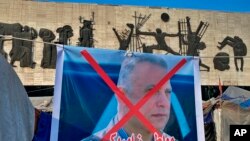Iraq's Prime Minister-designate Mustafa Kadhimi met with top members of the outgoing government Saturday to try to put together a new cabinet quickly, amid a rare level of support from the country's political establishment at a time of serious internal and external crises.
Amid reports the U.S. is deploying missile batteries to protect several key military bases against threats from Iran and its proxy militias, Kadhimi also appears to enjoy the support of Tehran and its local allies.
Khattar Abou Diab, who teaches political science at the University of Paris, told VOA that Kadhimi was a "personal friend" of Iran's national security adviser, Admiral Ali Shamkhani, one of Tehran's two point men on Iraq since Major General Qassem Soleimani was killed by a U.S. drone strike in early January.
Abou Diab said Kadhimi, who is also the country's intelligence chief, was "probably not the U.S.'s first choice to be Iraq's new prime minister, but that Washington has had fairly good relations with him in the past and probably is prepared to live with his nomination."
US-Iraq dialogue
U.S. Secretary of State Mike Pompeo proposed this week that Washington and Baghdad "hold a strategic dialogue in June" to discuss the presence of American forces in Iraq. Kadhimi told Iraqi TV on Friday that he would be a stickler for defending national sovereignty.
He said that Iraq's sovereignty was a "red line" and that he would not be flexible about it. Iraqi sovereignty, he insisted, will not be a subject for debate, and Iraq's destiny is in the hands of its people, to whom it belongs.
Kadhimi insisted that "no one, outside the government, should be allowed to bear arms," but he left a loophole by confirming that the country's Shiite Popular Mobilization Units, known as Hushd al-Shaabi, are a government entity.
The U.S. has placed a $10 million bounty on the head of Sheikh Mohammed Kawtharani, head of the the pro-Iranian Iraqi Hezbollah militia, which is part of Hushd al-Shaabi. Washington suspects that Kawtharani is responsible for past attacks on American forces inside Iraq and also is preparing fresh attacks.
Given the precipitous recent decline of oil prices, Iraq, a major oil exporter, is facing serious threats to its ability to pay its civil servants, in addition to meeting the many demands of protesters for better public services and less corruption, among other things.
Dr. Paul Sullivan, a professor at the U.S. National Defense University, told VOA that Kadhimi "is a tough and smart fellow," and as a veteran intelligence agency chief "likely has files on everyone of note and could call on those files to pressure people to toe the line."
"[But] trying to create a peaceful and stable Iraq," Sullivan added, "may be one of the toughest jobs out there. If the economy and jobs don't turn around, even the toughest people cannot keep [the country] together for long."




